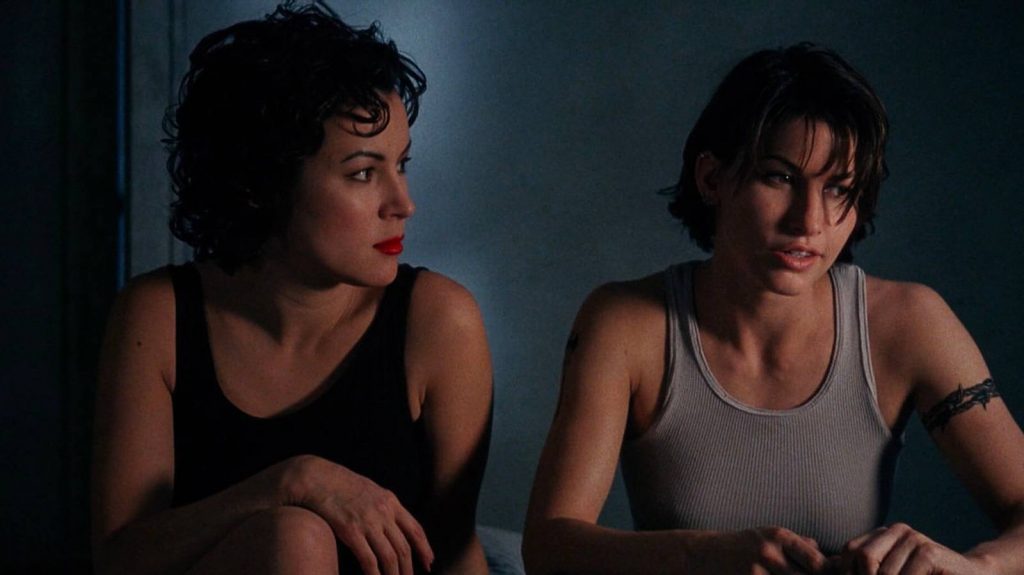When the Wachowskis made Bound in 1996, they weren’t yet renowned sci-fi visionaries and revolutionary filmmakers. They were just a pair of screenwriters with one minor commercial success, the critically panned 1995 thriller Assassins. They might have had big ideas, but their directorial debut had to be small-scale and lean, made on a relatively low budget for a Hollywood movie. There are no grand, sweeping statements about the universe, no reinventions of cinematic technique. There are guns and money and two characters with a plan to make a fortune while possibly making a killing.
It would be inaccurate to say that Bound, released 25 years ago this week, isn’t ambitious, though. Even in this mostly pared-down crime thriller, the Wachowskis bring visual inventiveness to nearly every scene, and the story subverts traditional noir themes in surprising and delightful ways. The set-up is pretty basic: Next door neighbors Violet (Jennifer Tilly) and Corky (Gina Gershon) meet in the elevator of their apartment building, form an instant romantic and sexual bond, and conspire to steal $2 million from Violet’s mobster boyfriend Caesar (Joe Pantoliano) and run away together.
To say that Violet and Corky “meet” in the elevator isn’t quite accurate—they share only a glance, while Caesar stands obliviously between them, but that glance is enough for them to feel a connection deeper than someone like Caesar could ever imagine. Their mutual seduction begins with that single glance. Just out of a five-year stint in prison, Corky has been hired to renovate the apartment next to Violet and Caesar’s, and Violet shows up the next day offering her a cup of coffee. Later, Violet has the building’s owner send Corky over to retrieve an earring that Violet claims she accidentally dropped down the sink while doing dishes. She stands there in a negligee, while Corky performs perhaps the sexiest plumbing job in cinema history.
There’s no need for the pretense, really, and it’s not long before the two of them are making out. When Caesar comes home and nearly catches them in the act, he’s angry until he realizes that Violet was alone with a woman, not a man. He can’t even conceive of the idea that his bombshell girlfriend could be anything other than straight. Violet and Corky take advantage of Caesar’s entitled obliviousness when hatching their plan to steal a case of money that he’s holding for a local mob boss, and he underestimates them at every turn, even when he seems to have figured them out.
The seductive stranger who draws the naive protagonist into a criminal plot is a film-noir staple, but neither Violet nor Corky are ever playing each other. Bound is like a noir with two femme fatales and no patsy, and it’s both smart and deeply satisfying that the Wachowskis resist turning the story into a tragedy. Complicated noir plots rarely end well for the people doing the plotting, and queer love stories in film are still often built on sadness and oppression.
There’s none of that in Bound, although Violet and Corky’s carefully laid plans do go awry, and Caesar hurls plenty of epithets at Corky when he discovers her relationship with Violet. “What did she do to you?” he asks Violet, as if being brainwashed or threatened is the only way she could possibly have fallen in love with a woman. “Everything you couldn’t,” Violet responds, proud and defiant even in the face of potential violence.
The chemistry between Tilly and Gershon makes every moment between Violet and Corky feel electric, and the Wachowskis’ camera (under the guidance of cinematographer Bill Pope) takes on a sensual quality as well, sliding along the phone cord from one apartment to another, or watching a jet-black trash bag full of money sink into a bucket of blindingly white paint. With his thick Chicago accent and near-constant sheen of flop sweat, Pantoliano makes Caesar into a figure of comic menace, ridiculous but still clearly dangerous. His unpredictability sends the couple’s plans into unexpected directions, and most of the second half of the movie is about Violet and Corky managing Caesar like he’s some kind of overgrown toddler with a gun.
Unlike the sci-fi worlds of later Wachowksi movies (from the Matrix trilogy to Cloud Atlas to Jupiter Ascending), where death might be merely a simulation or a portal to another realm, Bound makes its violence feel immediate and consequential. Every bullet, every punch has the potential to harm or kill the main characters, and that’s why the relationship between Violet and Corky is so beautiful. They’re survivors, not just of Caesar’s wrath and the mob’s retribution, but also of expectations and judgments placed on people like them. “Everybody knows your kind can’t be trusted,” Caesar snarls at Corky, but Violet and Corky know that the only people they truly can trust are each other.
“Bound” is now streaming on Hulu and Paramount+.

